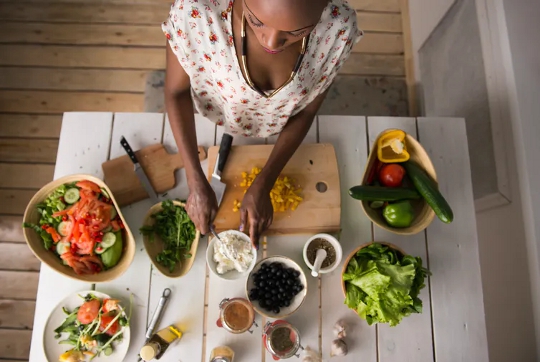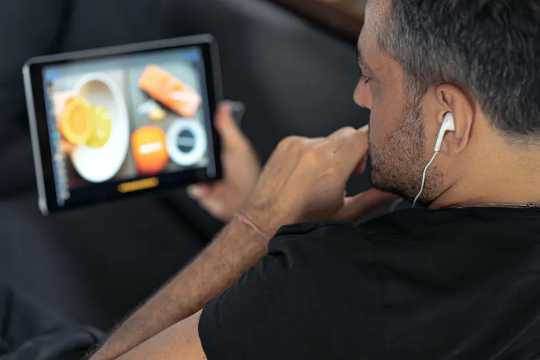
Preparing your own food may lead you to eat more. Milles Studio/ Shutterstock
The media is awash with cooking programmes. From chatty breakfast TV slots to extended cookery competitions to the more extreme “mukbang” social media extravaganza, watching other people prepare food from the comfort of our sofa has become the norm over the past few decades. But this kind of entertainment could have an impact on our own eating habits. Our recent study showed that both watching food being prepared by others and preparing it yourself led to eating more.
Our study explored the impact of passive food preparation (watching someone else) and active food preparation (doing it yourself) on eating behaviour. The eighty female participants were randomly given one of three activities, each lasting ten minutes. They they either watched a video of a researcher making a cheese wrap, made one themselves using step-by-step instructions, or completed a colouring task before being given food. A fourth, control group were given a wrap to eat immediately without waiting ten minutes.
We measured participants’ desire to eat (hunger, fullness, motivation to eat) using brief questionnaires before and after the activities. We then asked them to eat either the wrap they had made or a similar one.
We found that the participants who watched the video ate 14% more wrap, and those who had made their own wrap ate 11%, than those who’d done the colouring task. Those in the control group who ate immediately also ate more than the colouring group.
Get The Latest By Email
We also found that participants who had either prepared their own wrap or watched someone else reported increased motivation to eat. Participants who had made their own wrap also reported greater hunger. The group who had been distracted from thinking about food by the colouring task showed no changes in their desire to eat.
Our findings agree with previous research, which has also shown that food images, TV adverts of foods, and cookery programmes can all lead to eating more. Some research has also shown that preparing food encourages both children and adults to eat more of what they’ve prepared.
 Watching food being prepared may also lead to overeating. olgsera/ Shutterstock
Watching food being prepared may also lead to overeating. olgsera/ Shutterstock
But to date these studies haven’t compared these active and passive food preparation directly. Nor have they taken place in a laboratory setting, nor have they had all participants consume the same foods – which can all have an impact on how accurate the results are. Our study shows that watching others prepare food and preparing food yourself could lead to eating more.
Food prep
So how might food preparation change what we eat? Quite simply, seeing food increases how much we think about it – and therefore how much we want it and eat of it. For example, one study found that participants who read an article about food while eating – as opposed to simply focusing on their food and eating mindfully without distraction – ended up snacking more later in the afternoon. This suggests that when we see food or think about it, we tend to eat more of it.
But watching others prepare food typically only uses our sense of sight. Preparing food ourselves may have additional effects because it’s multi-sensory. The smells, sounds and tastes of active food preparation tell our body that food is coming. This generates an anticipatory response in both our mind and body, getting us ready to eat.
Food preparation can also increase our sense of confidence and skill around food, making new foods less alien and more attractive – in turn making us more likely to try something different. This could lead to overeating or could make us more adventurous with healthier, novel foods.
Preparing food requires us to invest time and effort. This investment and a sense of having earned something makes whatever that thing is more pleasurable. This is also why watching others prepare food and preparing it ourselves can lead to eating more. But is this good or bad thing?
We hear a lot about the role of overeating in many health conditions, such as obesity, diabetes, heart disease, and even cancer. Watching unhealthy foods being prepared, or preparing unhealthy foods yourself could encourage eating more of them, which may exacerbate weight problems or other health conditions.
But that doesn’t have to mean that we shouldn’t keep cooking our own foods, or give up watching cooking shows. Instead, changing the kinds of foods we prepare or watch being prepared to healthier ones could potentially have a positive impact on our food intake and subsequent health by encouraging us to eat more of the kinds of foods that we perhaps used to avoid.
About The Author
Jane Ogden, Professor of Health Psychology, University of Surrey
This article is republished from The Conversation under a Creative Commons license. Read the original article.
books_food







